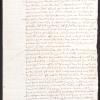
1623- marriage contract

This is the pre-marriage contract in 1623 for the Schoonhoven sisters' parents. Jacobus Adriansz van Schoonhoven and Josina Fredericksdr Ruiyven.
I think I can read that Claes Adriansz van Schoonhoven was supporting his brother, and Josina had her grandmother- Elisabeth Fredericksdr van Adrichem (described as a 'craftswomen' in some earlier legal documents). So I assume both her parents were deceased by 1623?
This may explain some of the wealth of the Schoonhoven family.
with many thanks for any assistance.
Anne
Reacties (3)
Hi Anne,
This is indeed a prenuptial agreement, composed on 23 August 1623.
The groom-to-be is Jacob Adriaenssz Schoonhoven, accompanied and assisted by his brother Claes Adriaenssz Schoonhoven and his nephew or cousin (see my remarks in another post about the double meaning of the Dutch word 'neef') Gijsbrecht Timenssz Verharst.
The bride-to-be is Josina Fredericx van Ruyven, accompanied by her grandmother Elisabeth Fredericx van Ruyven and her brother Mr. (indicating an occupation in law, such as a lawyer) Adriaen van Ruyven, as well by her legal guardians. The names of the guardians are not mentioned in the deed, but from the signatures we can read those must have been Bruijn H. Schinckel and Reijn or Reijer Jansz Orgel (not entirely sure about the exact name of the latter).
The groom will contribute the goods he already specified to the next-of-kin of the bride (the details of the specification are not in this deed); the bride will contribute the childs' part of the inheritance she received from her deceased parents (i.e. one-seventh part of the total parental inheritance).
Claes Adriaenssz Schoonhoven, brother of the groom, promises to hand over half of his business to the newly-weds at the day of her marriage for the first 3 years of their marriage. He has estimated the annual income at 1000 guilders per year; if they will earn less, Claes will compensate the deficit, of they will earn less, the profit will be to the newly-weds entirely. Claes also promises that the couple can live in his house and that he will provide them with food and drinks for these three years, all free of charge.
In case the groom would die within these first 3 years of their marriage, the bride will be entitled to half the promised annual income (i.e. 500 guilders) for the year the groom died in; Claes will not be held to provide her with any furniture or clothing.
All assets and profits earned within their marriage will be joint property of both groom and bride. In case the groom would die childless before the bride, half of the assets and profits will befall to the inheritants within the groom's family; this also applies to all assets that clearly belonged to the groom's body (clothing, jewelry and trinkets). In case the bride would die childless before the groom, half of the assets and profits will befall to the inheritants within the bride's family; this also applies to all assets that clearly belonged to the bride's body (clothing, jewelry and trinkets). Assets either of them would have inherited from their respective families would befall to members of the family they inherited from.
In case the groom would die childless before the bride, she was to inherit a one-time dower of 1000 guilders.
All profits and losses of the couple will be shared 50-50.
Dear Rene
Thank you so much for your reply, which is very interesting about the Schoonhoven and Ruyven families.
Josina's grandmother Elisabeth Fredericksdr , with her husband Dirck set up a home for single Catholic women in Delft in 1605. My husband and I were in Delft this weekend and visited the site of the almshouses which still exist today.
I will look into Claus Schoonhoven who gave half of his business to his brother and his new bride. I think he was described as a merchant, but also a 'pond collector' - (English translation). I have no idea what that meant in 17th century Delft! The house they will live in with him is the 'Clauw' where eventually the 3 Schoonhoven sisters ran their pottery factory from.
very best wishes
Anne

Anne
zei op woensdag 4 juni 2025 - 12:02